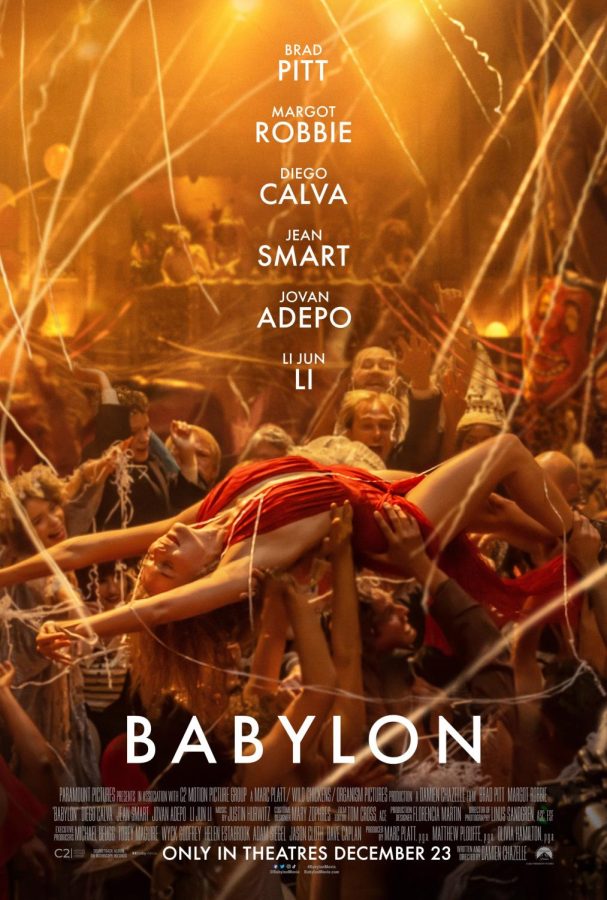“Babylon” review: The trials and tribulations of Hollywood’s metamorphosis
January 27, 2023
Damien Chazelle, writer and director of “Whiplash” and “La La Land,” presents audiences with yet another awe-inspiring masterpiece that depicts the rise and demise of starving artists in the blooming decades of Hollywood. “Babylon” poses as a rivetingly chaotic tribute to the indelible impression cinema continues imbuing in cinephiles, from its inception and for eternity. It absorbs you into its absurdity and depravity right from the start, introducing an array of aspiring and experienced stars who are determined to claim and maintain their fame.
From a biblical perspective, “Babylon” is a city that represents moral corruption and epitomizes materialism. This allegory permeates throughout the film as it alludes to Hollywood’s reflection of this biblical disorder, so much so that stills of the film’s opening scenes resemble that of the 16th century painting “Christ in Limbo” by Hieronymus Bosch.
The cast is composed of many notable names, some with cameos you’ll miss if you blink. However, it centers on silent film star Jack Conrad (Brad Pitt), rising starlet Nellie LaRoy (Margot Robbie), and budding producer Manny Torres (Diego Calva). Pitt’s performance was as monotone as it’s been for some time now. It felt as though I was listening to him do a cold read of the script for the final product. Robbie, on the other hand, gave her most impressive performance since “I, Tonya”. She embodied this insufferable, self-sabotaging actress that I couldn’t help but detest, making her performance top-tier. An additional portrayal that impressed me came from Jean Smart as gossip columnist Elinor St. John, who delivers the film’s moral story; that the magnitude of art and anyone’s contribution to it will remain until all ceases to exist.
An aspect of the film I found distasteful was the brief, almost tone-deaf focus on Hollywood’s racism. Sidney Palmer (Jovan Adepo) is a gifted musician who utilizes the emergence of sound in film as his ticket to stardom. Adepo portrayed Sidney Palmer in such an invigorating manner that it was upsetting to see the character written with such little depth. In all honesty, it gave the impression of Chazelle’s mediocre attempt at diversifying his characters in an act of redemption after “La La Land’s” Best Picture loss to “Moonlight” in 2017.
I was particularly impressed with the costume choices for Anna May Wong (Li Jun Li) and Elinor St. John (Smart), along with the detail to their hair, makeup, and accessories. It made the anticipation and resonance of their lines much more powerful. Ultimately, many moments of dialogue in the script reminded me that at its core, “Babylon” is an eccentric, dark comedy.
I’d say that if “Babylon” truly stands second to none for any category at this year’s Academy Awards, it would be for “Best Score.” Justin Hurwitz unarguably composed the most vivacious and exuberant film score I have heard in quite some time. Every song enhanced every scene.
Conclusively, I can see how the film’s final scene was subjective. On one hand, it was perceived as a montage of cinema’s evolution thanks to technical advancements. On the other, it was an ambiguous amalgamation of movie clips edited together, which may have been confusing to some. Personally, I viewed it as an implication that cinema is ever changing and here to stay, despite all the obstacles it may face (the most recent being COVID, for example). All in all, “Babylon” is a picture I think will hold cultural significance for some time.
“Babylon” is now playing in theaters.









